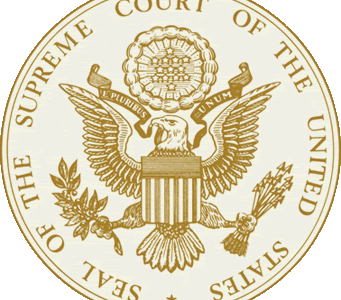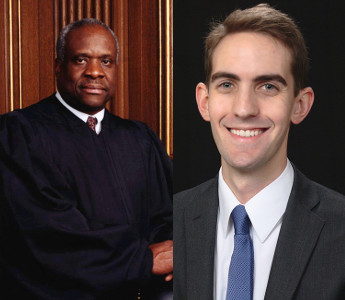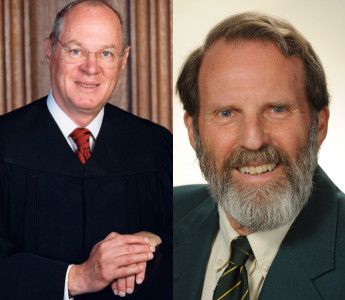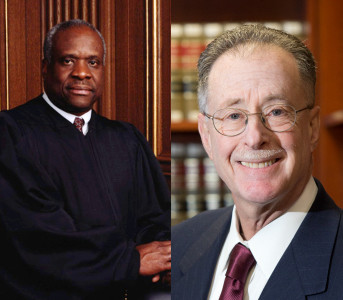Campbell-Ewald Co. v. Gomez, 577 U.S. ___ (2016) (Ginsburg, J.).
Response by Dean Alan B. Morrison
Geo. Wash. L. Rev. Docket (Oct. Term 2015)
Slip Opinion | New York Times | SCOTUSblog
A (Temporarily) Failed Pick Off
In Campbell-Ewald v. Gomez, the Supreme Court ruled that the defendant’s attempt to pick off the class action claim in the case failed for the time being,1 but, like the runner who safely gets back to first base, the pick-off attempt here is almost certain to be tried again, and the fate of the class claim is uncertain.
Jose Gomez, age 40, received an unsolicited text message that was aimed at men between ages 18-24, which he alleged was a violation of the Telephone Consumer Protection Act.2 Because the Act provides for treble statutory damages of $500 per violation, and it appeared that the unwanted solicitation was sent to over 100,000 people, Gomez filed a class action seeking damages for the entire class. The response of the defendant was to make an offer of judgment under Rule 68 to pay all of Gomez’s damages and costs, but to do nothing for the class. The obvious goal was to pick-off the lead plaintiff for $1500 or so, and thereby moot the class claims since the class would no longer have a champion. Gomez rejected the offer, but the lower courts nonetheless ruled that the case had become moot and they dismissed all the claims, including those for the class.
By a vote of 6-3, the Supreme Court reversed and remanded the case, not only rejecting the mootness argument, but to make matters worse, finding Campbell’s immunity claim, based on the fact that the message was sent on behalf of the Navy, to be without merit.3 The part of the mootness argument based on Rule 68 was quite easy because that Rule by its own terms makes an offer that is not accepted within 14 days a nullity.4 Campbell had also made another offer, not tied to Rule 68, and three dissenters, in an opinion by the Chief Justice in which Justices Scalia and Alito joined, concluded that the case was moot because there was no question that Campbell was willing and able to provide Gomez all the relief to which he was entitled even though, as the Chief Justice put it, Gomez “won’t take ‘yes’ for an answer.”5
But to Justice Ginsburg and the others in the majority, the failure of Gomez to accept the offer did not render the case moot, even as to Gomez. The majority noted that Campbell had not deposited the full amount into an escrow account and made a motion asking the court to enter a judgment that the claim of Gomez had been fully satisfied, even though it seems quite clear that such an option remains open and is likely to be exercised on remand. Justice Thomas concurred in the judgment, because there was no more than a “mere” offer from Campbell (a term that he used 10 times). 6 Rather than relying on what he called “modern contract law principles,” Justice Thomas reviewed the history of Rule 68 and its origins in the common law doctrine of unaccepted tenders, relying heavily on a 1903 treatise and cases from the mid-1800s, to reach the same conclusion that an unaccepted tender was of no legal significance.
Because the case was remanded, Campbell can try a pick-off move again, but this time it will have to go further, such as by paying the full amount that Gomez personally seeks into the court and then moving for summary judgment, arguing that there is nothing further it can do to make the Gomez’s claim go away. At that point, the issue will probably not be whether Mr. Gomez can be required to take “yes” for an answer, but whether the class claim can remain alive. In prior cases, the Court has allowed claims that were moot as to the named plaintiff seeking injunctive relief to continue with the named plaintiff as the class representative when the class had been certified before mootness,7, or even when the motion to certify has been filed but denied,8 but this case is different for several reasons. No class certification motion has been filed, let alone acted on; the claim is only for money damages; and unlike the laws and practices challenged in the prior cases, the conduct at issue here is not likely to recur. One tactic that some would-be class counsel have used to combat the pick-off move is to file a class certification motion with the complaint, even though, under cases such as Wal-Mart v. Dukes,9 the motion would almost certainly be premature or at least in need of significant supplemental to be granted. It is hard to imagine a majority supporting that kind of end-run on the pick-off maneuver because it is so transparently an effort to do nothing but avoid mootness and because it would largely produce make-work for no substantive purpose, not to mention making the courts look silly and highly formalistic.
It is difficult to resist the temptation to predict what will happen to round two of the pick-off battle. Of course, no one, including Mr. Gomez and especially his attorneys, cares very much as to whether his claim is moot, i.e., whether he has to take the money. Rather the only meaningful issue is what will happen to the class claims. On the one hand, there is the desire by some members of the Court to limit litigation generally, and class action litigation in particular. There are plainly three votes to end the class litigation, and given Justice Thomas’ general predilections to limit standing and to rule against plaintiffs on other access issues, his vote for the plaintiffs in this case should be seen as his insistence on having the courts follow all technical requirements and not as support for saving consumer class actions generally.
On the other hand, there is something seemingly offensive when a well-heeled defendant can pay off the named plaintiff and avoid having to defend a claim that it wrongly injured thousand or perhaps millions of consumers. Justice Ginsburg and the four Justices who joined her could theoretically side with Campbell once the unaccepted offer problem were removed, but that seems unlikely. After all, except Justice Kennedy, they all dissented in 2013 in Genesis HealthCare Corp. v. Symczyk,10 which Justice Ginsburg distinguished in Campbell on ground that the plaintiff there did not dispute in the lower courts that her claim was moot. Justice Kennedy, who is the likely swing vote, surely knows that either this case or a nearly identical one will come back, with only the class action pick-off issue still in the case. In theory, he could have joined the majority in Campbell for technical reasons, but would join the dissent if there were more than an unaccepted offer. However, since the pick-off issue was briefed and argued in both Genesis and Campbell, it is hard to imagine why Justice Kennedy would want to go through this a third time and then rule for the defendant, especially when there were already three dissenters in this case.
There is one other possible factor to consider. The Court has heard argument in Spokeo, Inc. v. Robbins,11 in which the defense argues that a statute similar to the one at issue here cannot create a right to sue in federal court for money damages for an inchoate injury, like receiving an unwanted text, without some other form of concrete harm. If the defense prevails in that case, it is likely to knock out cases like Campbell-Ewald without having to pick off the named plaintiffs.
For now, all can confidently be said is that the runner avoided the defense’s first pick-off maneuver, but the defense still has a number of different moves that it can make to avoid having to litigate the class claim on the merits.
1. See Cambell-Ewald Co. v. Gomez, No. 14-857, slip op. at 15 (U.S. Jan. 20, 2016).
2. 47 U.S.C. 227(b)(1)(A)(iii).
3. Campbell-Ewald, slip op. at 14.
4. Fed. R. Civ. P. 68(b)
5. Campbell-Ewald, slip op. at 10 (Roberts, C.J., dissenting).
6. See Campbell-Ewald, slip op. at 1 (Thomas, J., concurring).
7. See Sosna v. Iowa, 419 U.S. 393 (1975)
8. See United States Parole Comm’n v. Geraghty, 445 U.S. 388 (1980)
9. 564 U.S. ___ (2011).
10. 569 U. S. ____ (2013).
11. No. 13-1339 (argued Nov. 2, 2015).
Recommended Citation
Alan B. Morrison, Response, Campbell-Ewald Co. v. Gomez, Geo. Wash. L. Rev. Docket (Jan. 23, 2016), http://www.gwlr.org/campbell-ewald-co-v-gomez-a-temporarily-failed-pick-off/.





